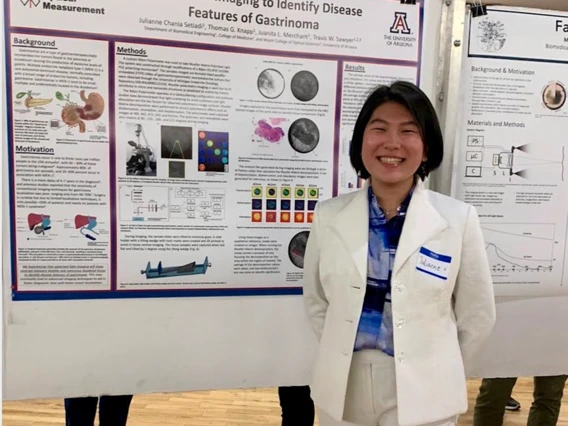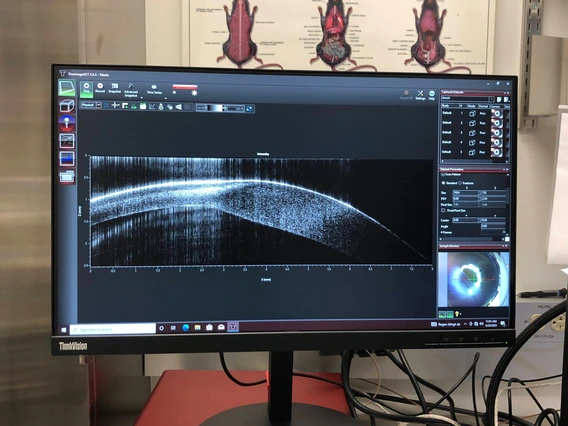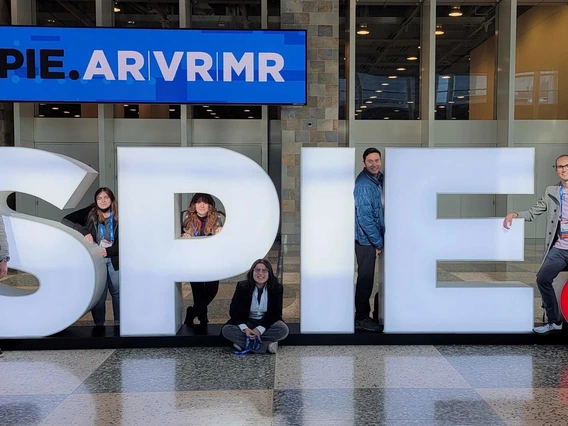


Q: Please tell us about your research
A: My research is using polarized light imaging to capture images from gastronomic light samples. Gastronome is a rare type of cancer and mainly happens in the small intestine, stomach, liver, and pancreas. It has a high mortality rate and is not detected until it is too late. The tumor is small in diameter and often missed in endoscopes. We want to figure out where the tissue came from and what mutated to get this tumor. I use polarized light imaging to see the specific Characteristics of this tumor so we can find a way to diagnose it so we can have an early diagnosis and cure it locally. When it comes to localization there is not a proper imaging for it. The current solution we have is getting rid of most of pancreas, a small portion of the stomach and liver. It is not eve guaranteed it is cured despite the removal of portions of the organs, this is due because the tumors are small. There are two types of gastronomes, one is erratic and the other is genetic. The reason we can detect it is due to the levels of the gastronomic hormones and that triggers the stomach to release lots of acid and can cause ulcers and destroy organs the acid touches. The survival rate is low, and mortality rate is 90%. There is a lot we do not know about them.
Q: What is the name of your research mentor and mentors?
A: Dr Travis Sawyer, and graduate student mentor is Thomas Knapp. There are other undergrads, but we work on different projects therefore work with different studens.
Q: What was the most frightening or surprising part of research?
A: Frightening part is when we start something, I always get scared that I will be the person to break the machine. Or if its my first time making a presentation and if I do not know as much as the professor. I wonder “what if this is all wrong”. But after you do it you realize it’s not bad. surprising part is, I thought research was expecting undergrads to know a lot and to be an expert within the field and have a ton of updates all the time when I have meetings with my PI. Then I learn eventually that doing research requires a lot of patience and trial and error. The machines cannot work causing images to come out bad. You may not have an update for that experiment, you don’t always have to be the star student within research. That is when I thought research is supposed to be interesting not stressful.
Q: What skills have you gained from your research?
A: I feel I have gotten better at presenting and when I looked though papers I do not get as intimidated anymore. I used to get terrified of looking stupid when I am presenting something because everyone in the room is grad students, I am sure they know way more about subjects then I do. But I have gotten a lot less intimidated because I have learned I absorb a lot more if my mind is not full of fear. Also being able to meet and talk with people from different backgrounds. Some graduate students study different things and graduate students may be on a different track or working on a different topic.
Q: How has your research benefited you academically or professionally?
A: On an academic level, is the things I do in research I eventually learn in class. I present better and work better. I go to my first conference this year and it shows you what other studies are going on. Academically it helps me decide what classes I want to take for electives. I joined the research lab and realized I enjoyed optics; the classes I am taking now are geared toward optics. It helped narrow down what I want to do in biomedical engineering. On a personal level, I gained a lot of friends and feel a lot less imposter syndrome. I learned how to build relationships professionally and learning how to balance work and life. Also, I have a lot of 1:1 meetings with my PI and that showed me everyone is on their own pace. I just have to focus on what I am doing. I learned a lot of lessons, such as graduate students have gone through almost all the same things, we are going through so they are able to provide advice. I have been in the lab for a year.
Q: What is one think you wish you knew about undergraduate research before getting started?
A: That it is okay to not have prior experience because you will learn it on the job anyways. Also, it Is not as difficult as I though. The whole point of doing research is there is something unknown that you need to figure out.
Q: What advise will you want to give other undergraduates to do research?
A: Stop doubting yourself and just go for it.
Q: What has been the best part of your research experience?
A: My lab does lab socials, so I love talking with the people. Also, to get complimented and acknowledged for the work you are doing during conferences. It shows that we are part of a bigger picture
Q: What has been the most challenging part of your research experience?
A: To force yourself or telling yourself it is good to remain curious despite if you think you learned everything.
Q: What are your future plans for when you graduate?
A: Ideally, I want to work with laser camera companies that makes them specially for dermatology. To me it is such a prominent field. Rashed, or acne, people go through lengths to have it recovered. The amount of time people put into it is mind blowing. To me there are a lot more people dedicated to how their skin looks and I think it is interesting, all the technology behind it is interesting. I want to work a few years before going to graduate school.
Q: Do you think the biomedical undergraduate research department is good?
A: I think it is good, I have all good experience with it. I really enjoy it that I do not feel it is lacking anything. I recommend it.
Q: What is it like working with your team?
A: It is nice because I get along with all of them. Our projects are all separate, I go for advice but that does not mean I am not reliant on him. Each PI has different expectations for the grad and undergrads, I like how mine was more independent.

